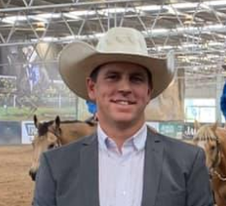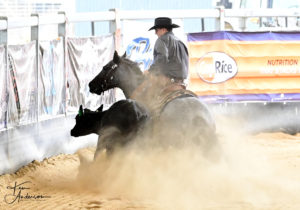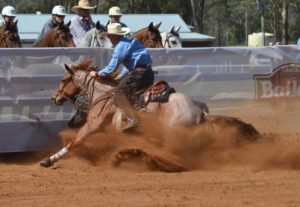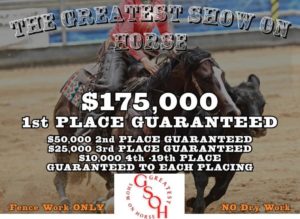
ARCHA President Aaron Scobie
While reflecting with friends about the glory days of the Australian Reined Cow Horse Association, Jay Gordon hatched an idea.
“I was sitting there listening to [the stories] and thinking we have a daughter and I‘d love for [reined cow horses] to be there so she has the opportunity to try and go do cow horses. It was a bunch of us sitting around and we just decided, let’s try to restart the ARCHA and see what happens,” Gordon reflected.
The ARCHA is technically about 40 years old but it fell apart years ago when the non-pro class in cutting started taking off, and others went over to the more established sport of camp drafting. The horse industry at the time just couldn’t support all of those events.
In 2018, Gordon and his wife Bec with the help of Dawn O’Reilly, Steve Izod, Karen Craft, Jo Fowler, De Hinton, Aaron Scobie, Megan Hensley and Murray Wilkinson, began the first steps to revive the association.
Gordon is from New Jersey and Bec is Australian. She had a cow horse background. They met in the United States and later married and moved to Australia to be closer to Bec’s family. Numerous other people had tried to re-start the ARCHA but the sport never caught on.
Gordon was full steam ahead to get the first show on the schedule but his wife encouraged him to do it right. She said this meant getting accredited judges in Australia.

Scobie going down the fence. Photo by Ken Anderson Courtesy of the ARCHA
Motivated and full of ideas, Gordon became the first president of the newly revived ARCHA. He had no experience running an organization but his time in the US Military as a Reserve Officers’ Training Corps leader gave him some important skills.
In November 2018 the ARCHA flew in an NRCHA judge for a seminar to reestablish cow horses in Australia. Step one was to educate judges and learn what the riding and training goals were. They ran a second seminar in May of 2019 and in August of that year they ran their first show called Pot Of Gold. People were keen to compete. Then they had their second major show, the National Finals, later that year.
“It took off because of the hard work that a lot of good people did. People embraced it because they were just ready for it…We capitalized on everyone’s strengths…Everyone stepped up to contribute,” Gordon said.
“The fact that cow horse has [grown] in the last couple years here is awesome. It’s definitely a passion. I really enjoy the versatility of it and the challenge trying to train one for three events. It’s pretty awesome when it works,” Aaron Scobie said of his love for the sport.
At the end of 2021 Gordon stepped down as president to pursue other endeavors like the brand new competition down the fence called The Greatest Show On Horse. Scobie was voted in as president and remains at the helm today.
Originally from New Zealand, Scobie spent some time in the United States to hone his craft as a performance horse trainer. He moved to Australia to train horses.
“Jay asked me to be on the board [two years ago], Jay stepped down and people put my name out there… I was listening to an interview with Todd Crawford and there was a quote in there saying if not you then who?…,” Scobie said when he was nominated as president.

“To me it is the ultimate challenge to have one horse do all those things…I like to compete and I love to work cows and ride cowy horses.” Stapleton said, pictured here going down the fence. Photo courtesy of the ARCHA
The ARCHA is an affiliate of the NRCHA so they run all of the classes including snaffle bit, hackamore, and boxing classes. To meet the need of cow horse competitors in Australia they added a two-hand version of these classes. They also run bridle classes.
There are about 20 competitors in the bridle classes and 35 horses in the futurity and derby classes. The two-handed class will have 40-50 entries according to board member, saddle maker and cow horse trainer Quentin Stapleton.
“Being able to ride two-handed on an aged horse [is important] just to plant the seed for [other people] to get keen on the sport. It wouldn’t have worked to have six year old horses shown in a bridle. But giving them the option to show two-handed has made the sport catch on,” said Stapleton.
One of the many ARCHA affiliates started a format that has a snaffle bit cutting followed by cow horse classes using the same cows. As an ARCHA board member, Stapleton suggested the association adopt that format on a broader scale.
Scobie said riders are drawn to cow horses because, “It’s really about horsemanship that goes into it. There isn’t the connection with the vaquero tradition [in Australia] although that certainly appeals to a lot of people, myself included…To me and a lot of people that have been exposed to the cow horses, it’s sitting up there as the pinnacle…”
Stapleton agreed, “To me it is the ultimate challenge to have one horse do all those things…I like to compete and I love to work cows and ride cowy horses.”
To continue generating interest in cow horses, Gordon developed The Greatest Show On Horse. It will showcase the incredible skill of going down the fence. The first qualification will let dirt fly April 28 – May 1. The final competition will be held September 11-17 2022, at Scone, NSW offering a $175,000 prize to the winner. The competition is open to anyone who qualifies.
Even in the wake of COVID the ARCHA has boomed. However, the affiliates were hit harder by the pandemic.
“We try to run five major events a year… We have managed to sneak everything in around the restriction, obviously moving dates. One of the biggest effects COVID has had on us is through our judges,” Scobie said.
The ARCHA ran judging schools using NRCHA qualified judges but COVID saw Australia close its borders to international visitors. With travel now unrestricted, the association can get its judging program back on track.

To continue generating interest in cow horses, Gordon developed The Greatest Show On Horse.
“It’s such an important point of leadership for the industry. Whatever those judges are marking and whatever is winning will be what people train for and we want to make sure that’s actually in line with what the NRCHA is doing. The NRCHA is the world standard for reined cow horse…” said Scobie.
Scobie said the sport’s biggest struggle is finding suitable facilities with each state having only one or two workable arenas. Getting the ground right and making sure the facilities can handle cows can be tough. When arenas don’t have cattle pens, the ARCHA will often build temporary yards.
Fortunately cattle supply is not an issue. Murray Wilkinson, who handles cattle for the ARCHA, told Scobie that he has suppliers calling him because they’re happy with how the ARCHA handles cattle.
As far as future goals, Scobie said the ARCHA hopes, “To continue to grow the industry and grow those major events especially the Futurity and Derby. We have had some great sponsors sign up…And continuing to build up the prize money and build the attractiveness for people to put cow horses in training is a big focus while supporting that non-pro/rookie area as well…”
